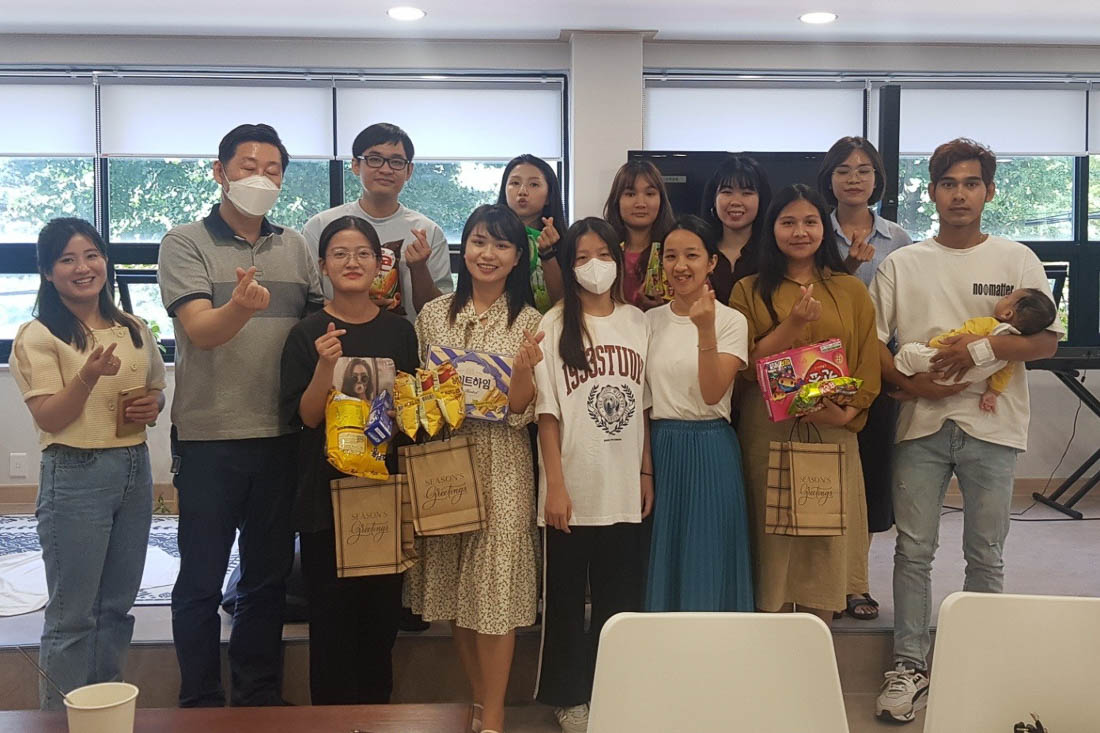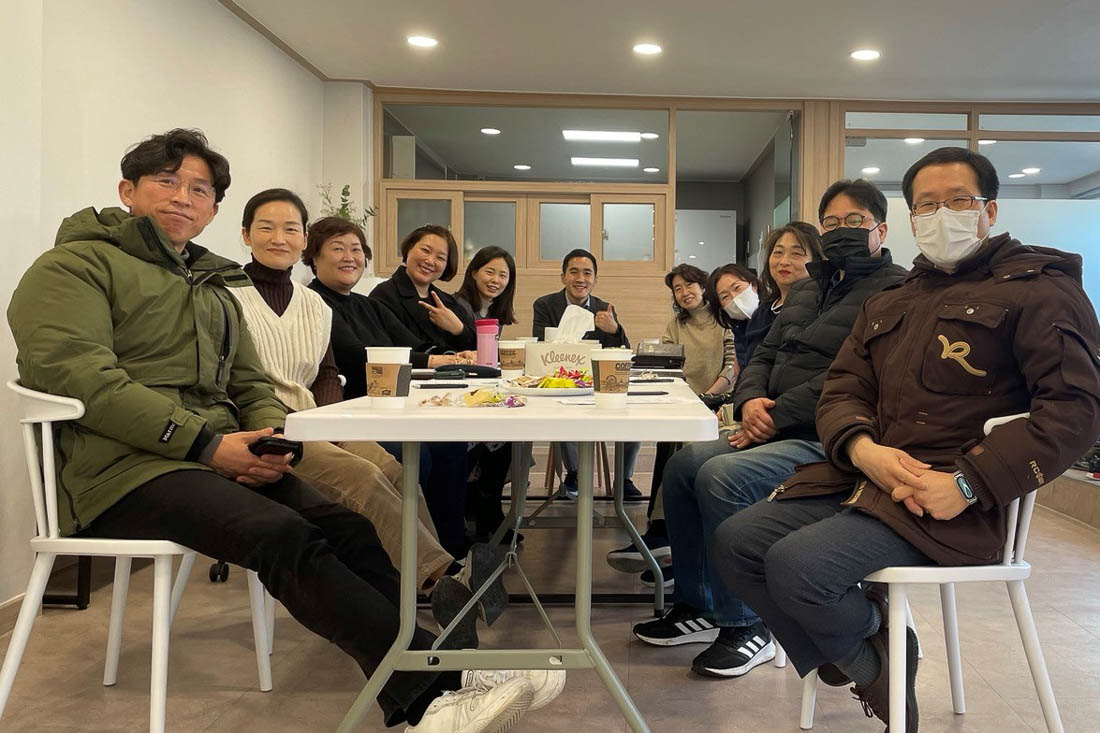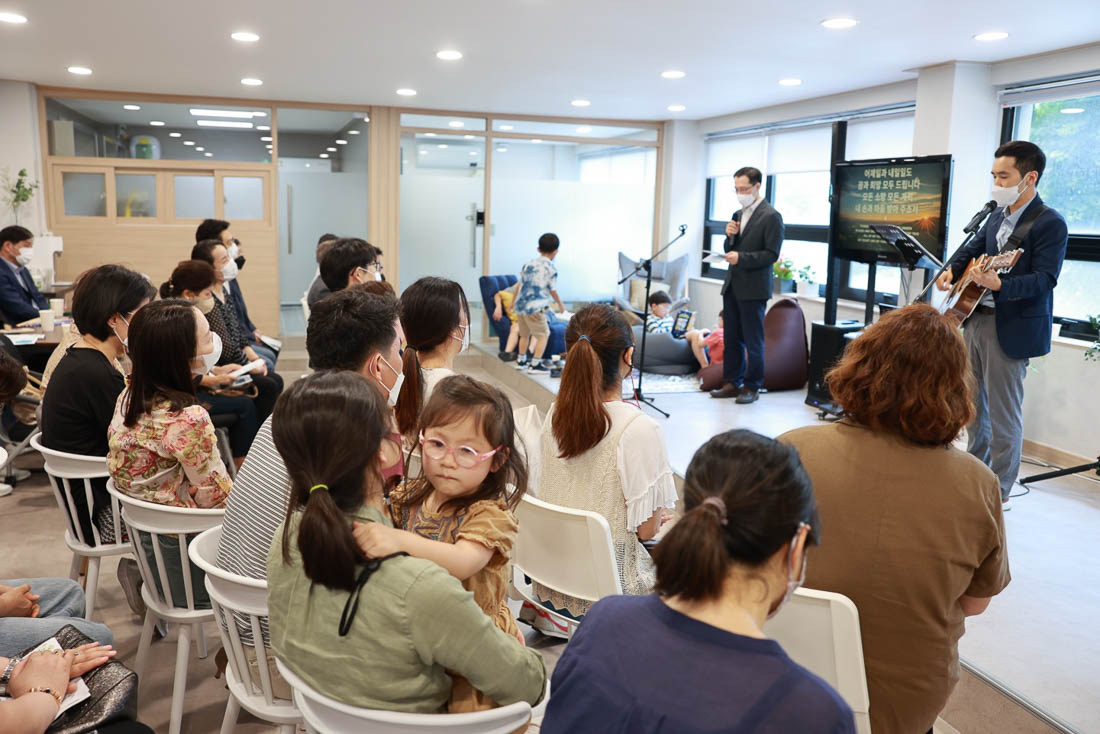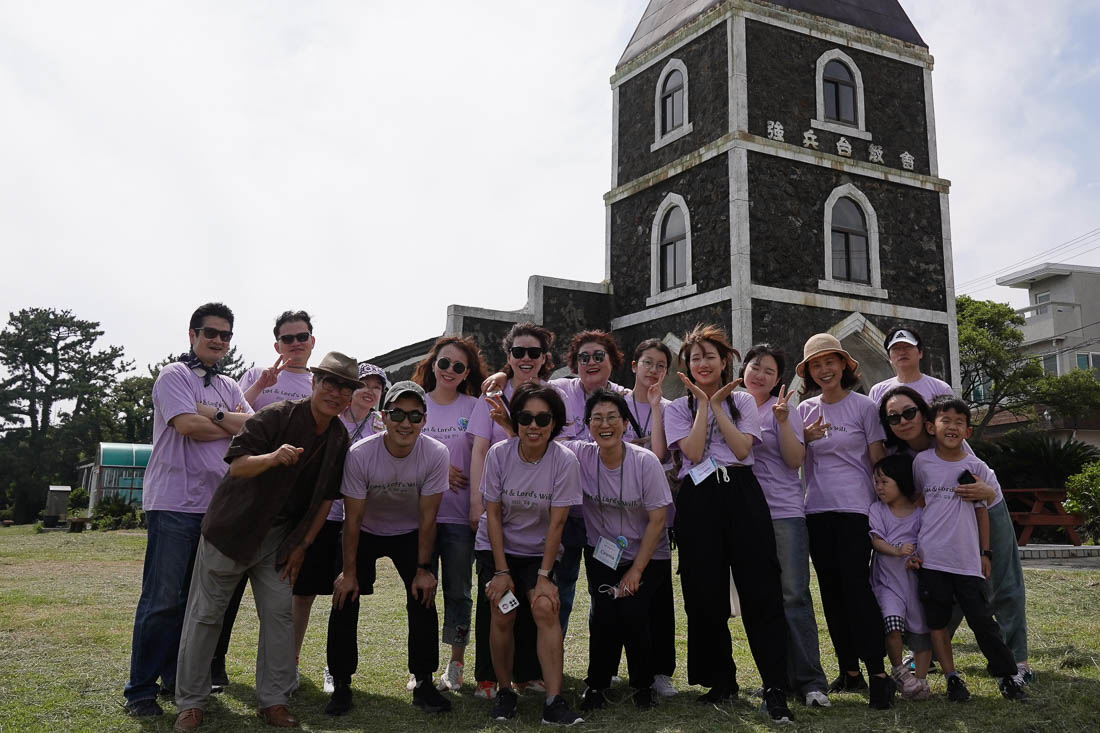The Benefits of Missions Work Among the Nations in South Korea
MTW missionary Jonathan Lee was visiting Amerasian Christian Academy, an English-speaking school in Dongducheon, South Korea, when he met a fourth-grade boy from Bangladesh.
“Hi! How are you?” Jonathan asked the boy in English.
The boy responded in perfect, unaccented Korean.
Jonathan was taken aback. With his brown skin and rounded eyes, this boy was clearly not a South Korean native.
“How are you so good at Korean?” asked Jonathan.
“I was born here,” replied the boy.
Those who live in the U.S. may balk at Jonathan’s surprise. We are used to meeting people of different ethnicities that were born and raised in America. However, this is a brand-new phenomenon in South Korea. For most of the country’s history, South Korea has been a mono-ethnic group, resistant to receiving foreigners. Jonathan and his wife, Joy, who both grew up in South Korea, can’t remember ever meeting a foreigner during their childhood and adolescent years.
Today, the Lees say they see foreigners everywhere. Global migration has given rise to a sizable international population in South Korea, with people from all over Asia-Pacific moving into the country and forming multicultural communities. Currently the country hosts 160,000 international students, 34,000 North Korean refugees, and 1.8 million migrant families. As the Lees witnessed the migration trend in their home country, they realized there was a new missions opportunity—they could minister to South Korea’s international population to reach nations of this world.

A Reluctant Pivot and Establishing the Diaspora Ministry
The Lees never planned on serving in South Korea. Jonathan’s and Joy's families immigrated to the U.S. when they were teens, and they met at a church in Maryland. Both attended Trinity Evangelical Divinity School in Deerfield, Illinois. After serving at a local PCA Korean immigrant church for seven years, God called Jonathan and Joy overseas. They had a passion for unevangelized and unreached people groups and joined MTW’s team in East Asia in 2019.
A few months later in January 2020, while attending a conference for church leaders in Malaysia, Jonathan received a call from a friend telling him that because of the COVID-19 pandemic the government was locking down the country* in which the Lees were serving, and Jonathan should stay away for two weeks. The Lees retreated to Joy’s parents’ house in South Korea, thinking that they needed to stay close because it would only be a few weeks before they were able to go back to their home.
A full year went by and there was still no sign they could move back to their original field of ministry. Meanwhile, in 2021 Mission to the World created a South Korean vision team that was determining a strategy for reaching South Korea and the team asked Jonathan if he would join them. He reluctantly agreed but told MTW he would only serve on the vision team until he was able to go back to the country where he had been serving. As another year went by, the Lees began to come to terms with the fact that God was permanently calling them to South Korea.
“I was thinking about evangelizing and doing missions and I had this question: ‘God, why did you put me in South Korea?’ Because my passion was in [the former location]. And then the more I found out what was going on in South Korea, the more I thought about how missions could look differently today.”
As Jonathan and Joy learned more about the demographics of South Korea’s international population, they began to see a way they could do global missions work in South Korea among unevangelized and unreached people groups. People were coming from unevangelized and unreached countries like Indonesia, Vietnam, China, India, Bangladesh, Pakistan, Sri Lanka, and Uzbekistan and forming ethnic and multi-ethnic communities.

In partnership with Lord’s Will Church in Yongin, South Korea, the Lees established Diaspora Ministry in 2022. Webster’s says a diaspora is a people settled far from their homelands through movement, migration, or scattering. Diaspora Ministry focuses on evangelism and discipleship to three target groups: international students, migrant families, and North Korean refugees.
The Lees registered a ministry team with the government and rented a space on the campus of Kyonggi University in the city of Suwon to serve as their ministry headquarters. Just 30 minutes south of the capital city of Seoul and home to eight other university campuses, the city of Suwon is a strategic location to serve their three target groups. Once they finalized the ministry plan and logistics, the team began reaching out to the lowest hanging fruit of these target groups: international students.
Diaspora Ministry Gains Momentum with International Students
For the past two years, the Lees have established several outreach and ministry programs for international students in Suwon, including retreats, an ESL program, and meals together. Most of the students are Vietnamese. The primary religion in Vietnam is Buddhism and Christians often face social isolation and violence for their faith. Therefore, most of the Vietnamese international students never had the opportunity to hear the gospel or connect with a local church before getting involved in Diaspora Ministry.
“I kept thinking, ‘How do I teach Vietnamese students … what the Church is because they have never experienced it?’ I can talk about it. I can explain it. But the point is: how can they experience what a healthy church is?” says Jonathan.
The church is trying to show them. Every week, volunteers from several churches cook dinner for the students in the ESL program. After their class, they all sit down to enjoy a meal together. Church members and their families also chaperoned the two Diaspora Ministry retreats, providing another opportunity for the students to get to know local Christian families. After one of these trips, a female Vietnamese student came up to Jonathan—crying—and said, “I wish my parents in Vietnam would come here and be a part of this community.”
Her longing told Jonathan that they are on the right path.
Though they are still developing Diaspora Ministry, the Lees and their team have already seen much fruit from their efforts among international students. They are providing these young people, living far from home, a loving community that cares for them and points them to Jesus.
One Vietnamese student who goes by the name of Kevin summarized why he thinks Diaspora Ministry is attractive to international students, saying: “DM really offered something that international students could afford [financially].” According to Kevin and Jonathan, Diaspora Ministry’s low cost ESL program—charging a minimal fee increases commitment—is the main draw for Vietnamese students who desperately want to learn English.
Kevin continued, “And then with what they were doing, I began to think, ‘Why do they serve and sacrifice to do things for us? They do not know us and they do not have to do this for us.’ After spending time with them for a year, I began to realize that those with DM are trying to do what God was teaching them to do. In my opinion, their faith and deed were aligned. It challenged me and I want to live like them.”
The university arm of Diaspora Ministry has provided enough momentum for Jonathan to begin making inroads with another of their team’s target groups. He’s praying for God to pave the way for conversations with North Korean pastors to figure out how Diaspora Ministry can support them and their churches. The Lees are also working to start a Diaspora Ministry school modeled after Amerasian Christian Academy in Dongducheon as an evangelistic avenue for migrant families.
The Need for Missionaries in a Reached Country
Why are you going to South Korea? It is not a mission field.”
This is the question Jonathan hears over and over again during conversations about where he is serving. It is a fair point. South Korea has a large evangelical Christian presence with plenty of Presbyterian churches. It is also one of the world’s top missionary sending countries, trailing only the U.S. and Brazil. However, the more time Jonathan spends working with and learning about the international populations in South Korea, the more he is convinced sending missionaries to countries like South Korea is a strategic way to reach unevangelized and unreached people groups.
First, the religious freedom that exists in South Korea offers a safe environment for gospel ministry. People are coming from countries with limited-to-zero access to the gospel and countries like North Korea that can be difficult, if not impossible, for missionaries to enter. But they are receptive to the message of Christ.
“I think there are huge advantages to reaching out to these groups of people because they are vulnerable culturally, emotionally, and spiritually. They are desperate and they are in need of help and so their attitude is very open,” he says.

Jonathan’s visit to Ameriasian Christian Academy was especially eye opening. The elementary students attending this school come from different religious backgrounds, and many of them faced racism in the Korean public school system. Others had trouble keeping up with the Korean education because they were still learning the language. The low tuition and international community this school offers makes it an attractive option for these families. Muslim, Hindu, and Buddhist parents are enrolling their kids in this Christian school fully aware that the teachers and speakers will openly and freely teach the Bible.
“Reaching out to Bangladeshi children in Bangladesh might be challenging. But in South Korea it is very safe. You don’t have to worry about being a target for certain groups. It is accessible for our national local churches and Christians to be involved,” says Jonathan.
Besides the safety advantages, Jonathan believes missions work among multiethnic communities in countries like South Korea is important because they are the future co-laborers of the kingdom of God among the unreached and unevangelized populations they represent. When Christians from these people groups take the gospel back into their communities and home countries, the potential impact is huge.
“I believe the people I’m serving in South Korea are closer than I am to the unreached or the unevangelized geographically and contextually,” says Jonathan. Also, their experience of moving to a new country creates many of the soft and hard skills needed for kingdom work. Many are trilingual: fluent in their own language, Korean, and English. Besides their language abilities, internationals typically develop grit and perseverance critical for cross-cultural ministry.
The Lees have met several people from an unreached people group that came to faith in South Korea and are going back into their native culture to spread the gospel. One such person is a young Pakistani Korean woman named Steph.
Steph grew up in Korea and attended Ameriasian Christian Academy where she became a Christian and was baptized in a local church. She is preparing to go to Pakistan as a missionary—a predominately Muslim country in which 99% of the population is unreached according to Joshua Project.
The North Korean pastors Jonathan is eager to partner with are another example of people who converted to Christianity in South Korea and are now serving among their own people group. While In the early 2000s, this group of North Korean men, most of whom were in their 20s and early 30s, fled to South Korea where they received care from local South Korean churches. They became believers, went to seminary in South Korea, and planted churches in South Korea among North Korean refugees. There is little doubt this is a ripe mission field.

The Broader Missiological Implications
The growing international population in South Korea is just a snapshot of a trend happening all over the world. People are on the move, coming from everywhere and going everywhere. This is changing the global missions landscape and raising significant missiological questions for the Church.
“Understanding the world is not possible without understanding that the world is moving,” says missiology expert Cody Lorance in a video for Lausanne Global. “So, if you are interested in business as missions you have to deal with the fact that people in business are moving all over the world. … If you really care about the 10/40 window, you have to deal with the fact that God has taken the 10/40 window and has dumped it out all over the rest of the world in our day.”
A globally mobile world raises both new challenges and new opportunities for the Church as we collectively think about remaining faithful to the Great Commission in the 21st century. In the same Lausanne Global video series, business as missions expert Joao Mordomo says, “You’ve got 100 million people minimum coming from countries and ethnic groups which historically have not had access to the gospel. And they are coming into places which historically allowed religious freedom and economic freedom. So, we are talking about the convergence of jobs and businesses with the need for the gospel to be proclaimed among people that represent unreached people groups.”
Jonathan can already attest to the truth of this as he and Joy serve unreached and unevangelized people in South Korea. He sees great potential for reaching the nations by making disciples among the international populations of the world. The gospel advancement the Lees have seen and been a part of in South Korea among unreached and unevangelized people groups underscores the need to embrace the global migration trend as a strategic avenue for spreading Christ’s message of hope and redemption to the ends of the earth.
*Location is not specified for security reasons.
Chelsea Rollman is a marketing specialist and staff writer at MTW. She formerly served as the girls’ discipleship coordinator at Village Seven in Colorado Springs, and as a marketing assistant at The White Horse Inn. Chelsea graduated from Covenant College in 2016 with her B.A. in English. She and her husband, Hudson, live in Jacksonville, Florida, and attend Christ Church Presbyterian where Hudson serves as the youth director.
GET INVOLVED
Kiki Adams’ Call to Counseling in Thailand Unfolded in God’s Perfect Timing (VIDEO)
When Trey and Kiki moved to Thailand, Kiki put her gift for counseling on the shelf. Years later, the Lord made a way for her to use it.
SEE MOREConnecting Deeply in Madrid: Q&A With an 11-Month Intern
After college, Emily Lanclos interned with MTW's team in Madrid, ministering to women in a city with a deep mistrust of the church.
SEE MOREWhat’s Really Needed to Serve in Global Missions? 7 Qualifications You Likely Already Have
Some perceived barriers are just weaknesses God can use. While others can be easily developed.
SEE MOREPray for God's work among the nations in South Korea through MTW's Diaspora Ministry.
Pray for those being ministered to through missionary Kiki Adams' counseling ministry in Thailand, and for the Thai people being trained and equipped to counsel others.
Pray for the ministry in Madrid, Spain, where there a deep mistrust of the church. Pray particularly for a group of young women a recent MTW intern ministered to.
Pray that young people would consider missions, even if they don't think they're qualified, and that churches would prioritize introducing the next generation to missions.
Pray that God would give us a burden for unreached people groups, and would raise up missionaries to go to the unreached.
Pray for church planters in Senegal working among the Wolof people, for the Timothy Houses training future pastors, and for the Teranga Village safe home for girls.
Pray for wisdom and clarity for those who are questioning whether God might be calling them to serve overseas.
Pray that we would love the world as God loves the world, and that we would respond to that love with action.
Pray that American churches would see the importance of continuing to support global missions.
Give thanks for God's work among the next generation in Scotland, and pray that many young people would live for Him as a result.
SUBSCRIBE TO STORIES & MORE
Good news in your inbox, once per week.
1600 North Brown Rd
Lawrenceville, GA 30043
United States
1-678-823-0004
[email protected]
Donor Advised Fund Portal
Circle Portal


